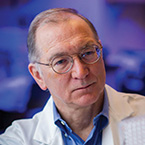
For groundbreaking contributions to the discovery of the PD-1 signaling pathway and the PD-1 ligands, PD-L1 and PD-L2, and for spotlighting the involvement of this pathway in tumor evasion of immunosurveillance.
An internationally celebrated scientist, Dr. Freeman is widely recognized for his groundbreaking work that contributed to the discovery of the PD-1 pathway. In studying the major pathways that control immune system responses, he was the lead figure in identifying the binding partners of the T-cell programmed death-1 receptor (PD-1), PD-L1 and PD-L2, and noted their increased expression across a variety of different tumor cell lines. These findings led to the determination that interaction of PD-1 with its ligand results in negative regulation of lymphocyte activation. This discovery led Dr. Freeman to hypothesize that the PD-1 pathway might be involved in tumor evasion of the immune system and that inhibition of this interaction could result in an activated anti-tumoral immune response.
This hypothesis was later proven as PD-1/L1 pathway blockade was shown to augment T cell activation and proliferation, as well as cytokine production, leading to enhanced CD8-positive T cell-mediated cell death in PD-L1 positive cancer cells. This concept of targeting immune system checkpoints has since revolutionized the field of cancer immunotherapy and has led to significant treatment breakthroughs. To date, six PD-1/L1 immunotherapy drugs targeting 14 different cancer types have received approval by the U.S. Food and Drug Administration.
Importantly, Dr. Freeman’s research group has also discovered the B7-1 and B7-2 peripheral membrane proteins found on several types of immune cells including antigen presenting cells (APC), and has demonstrated that these proteins serve as receptors for CD28 (costimulatory) and CTLA-4 (coinhibitory) proteins present on the surface of T cells. The dual role of these receptors allows them to be targeted to induce immune tolerance or stimulate anti-tumor immune responses. Most recently, Dr. Freeman has also characterized a secreted form of PD-L1 (secPD-L1), which may provide a novel role for the PD-1 pathway in the regulation of T-cell function in the tumor microenvironment.
Career Highlights
2022 National Academy of Sciences
2022 American Academy of Arts and Sciences
2019 Advanced Discovery Award, The Kidney Cancer Association
2017 Warren Alpert Foundation Prize
2016 Thomson Reuters Citation Laureate, Clarivate Analytics
2014 William B. Coley Award for Distinguished Research in Tumor Immunology, Cancer Research Institute
2014 Laguna Biotech CEO Forum Award
2014 Lymphoma Hub Award
2003 Highly Cited Researcher in Immunology, Institute of Scientific Information
1982 American Cancer Society Fellowship, American Cancer Society
1980 Damon Runyon-Walter Winchell Fellowship